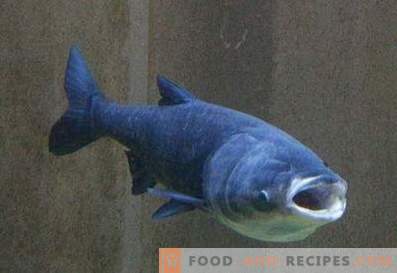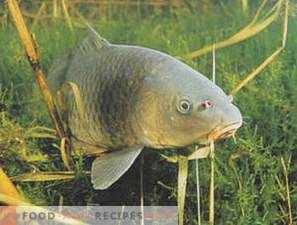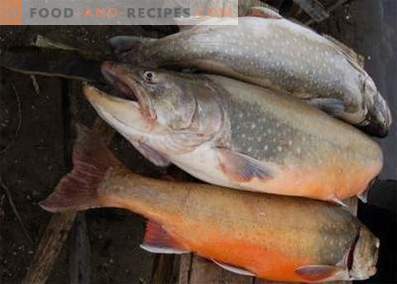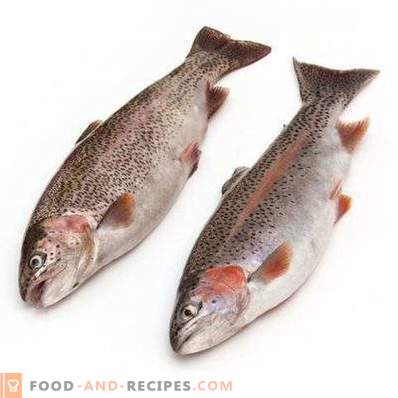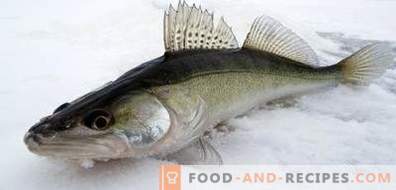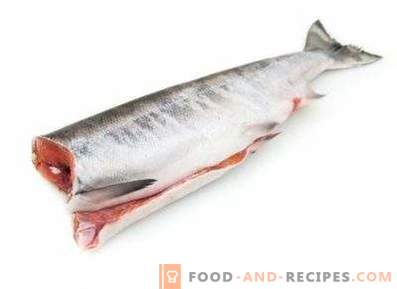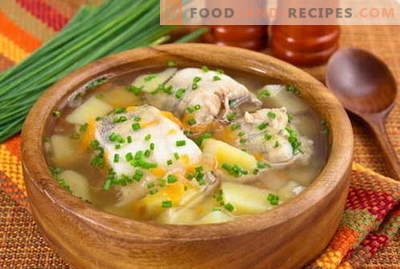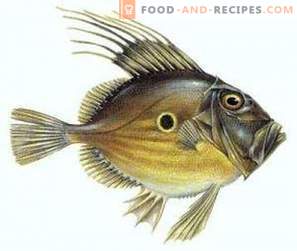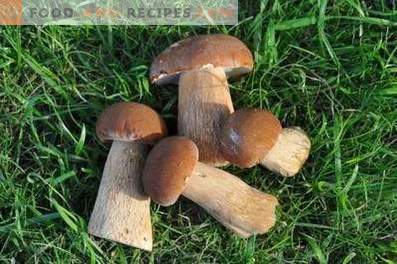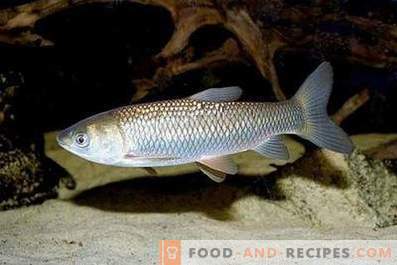
The grass carp is a herbivorous fish of the carp family. The natural range of representatives of this species, commonly referred to as grass carp, is freshwater lakes and rivers of East Asia. Large flocks of white cupids can be found in overgrown backwaters of the Don, Yenisei, Cupid and Volga.
Grass carp has an elongated cylindrical body, covered with rounded large scales, and a slightly pointed head with a small mouth. The back of the fish is yellowish-gray or greenish, the sides and irises of the eyes are gray with a golden sheen, the belly is whitish. The dorsal and caudal fins of the grass carp are colored dark gray. The remaining fins are light gray with a yellowish sheen.
The grass carp is distinguished by a rather rapid growth: over the year, representatives of this species increase by 100–120 mm. The largest individuals, grown in nurseries or caught by fishermen in wild waters, had a length of up to 122 cm and a weight of more than 30 kg.
Grass carp is considered a valuable object of fishing. The fatty meat of this fish is valued for its great taste and nutritional qualities. Herbs of carp are stuffed, baked in ovens and grilled, fried, boiled, steamed, stewed, smoked, used to make soups, meatballs, cutlets, snacks and toppings for pies.
Nutritional value of grass carp and vitamins in its composition
Nutritional value 100 g of grass carp:
- 18, 588 g of proteins;
- 5, 294 g of fat;
- 72, 768 g of water;
- 1, 134 g of ash;
- 59, 806 mg of cholesterol;
- 1, 596 g of omega-3 fatty acids;
- 0, 487 g of omega-6 fatty acids.
Vitamins in the composition of grass carp (in 100 g):
- retinol equivalent, A - 36, 101 μg;
- Niacin equivalent, PP - 2, 799 mg;
- pyridoxine, B6 - 0, 294 mg;
- phylloquinone, K - 0, 093 mkg;
- choline, B4- 64, 804 mg;
- cobalamin, B12 - 0, 966 mcg;
- tocopherol equivalent, E - 0, 184 mg;
- thiamine, B1 - 0, 137 mg;
- folic acid, B9 - 14, 693 μg;
- calciferol, D - 11, 337 mkg;
- pantothenic acid, B5 - 0, 748 mg;
- riboflavin, B2 - 0, 117 mg.
Caloric content of grass carp
In 100 g of white carp carcass intact, contains 124, 593 kcal. Information about the calorie content of dishes prepared from this fish are presented in the table.
The energy value of dishes from white carp, per 100 g dishes, kcal:
- fried fish: 166, 714;
- steamed carcasses: 133, 216;
- patties: 168, 219;
- fish baked in the oven or on the grill: 109, 984;
- meatballs: 159, 417;
- smoked carcasses: 142, 404;
- ear: 33, 598;
- fish stew: 131, 218;
- boiled carcasses: 108, 784.
The caloric content of 100 g of grass carp liver is 454, 739 kcal.
Useful elements in the composition of grass carp
Trace elements per 100 g of grass carp:
- iron - 0, 367 mg;
- zinc - 0,981 mg;
- selenium - 12, 512 mkg;
- copper - 71, 944 mkg;
- manganese - 0, 069 mg.
Macroelements in white Amur (in 100 g):
- potassium - 316, 818 mg;
- magnesium - 32, 118 mg;
- phosphorus - 269, 711 mg;
- sodium - 50, 682 mg;
- Calcium - 25, 712 mg.
Useful properties of grass carp
- Grass carp - a rich source of vitamins. People who regularly consume meals and snacks from this fish never encounter avitaminosis.
- Grass carp meat contains a significant amount of easily digestible protein with a balanced amino acid structure. People who include it in the diet at least 2 times a week, recover faster after increased physical exertion.
- Grass carp contains a whole complex of antioxidant compounds. Nutrients belonging to this group help to inhibit the aging process of body tissues, prevent the appearance of wrinkles. With regular consumption of this fish fillet decreases the risk of developing a whole group of oncological diseases.
- Retinol, which is present in the meat of grass carp, improves visual acuity, helps restore the visual apparatus after prolonged reading or watching TV, long-term work at the computer.
- Daily consumption of dishes prepared from white carp meat helps to fill the body's need for B vitamins. Compounds belonging to this group improve lipid, carbohydrate and protein metabolism, correct malfunctions of the digestive, hematopoietic and nervous systems.
- White carp fillet contains a whole complex of compounds that accelerate the excretion of toxic and radioactive substances, toxins, heavy metals, and cholesterol. The systematic inclusion of this fish in the diet helps to weaken the general intoxication of the body, reduce the risk of atherosclerosis and other diseases of the heart and blood vessels.
- Calcium, calciferol, phosphorus and other nutrients that enter the human body when eating white amur dishes contribute to the mineralization and strengthening of bone tissues, and reduce the risk of osteoporosis, rickets and other diseases of skeletal bones.
- Potassium and magnesium contained in the grass carp fillet strengthen the heart muscle, contribute to the normalization of blood pressure.
- Amur is a rich source of selenium. That is why the daily inclusion of snacks and dishes prepared from its meat in the diet strengthens the immune defense, increases the body's resistance to infections and parasitic invasions, improves the processes associated with the production of thyroid hormones, reduces the likelihood of developing thyroid diseases.
- In the composition of white carp fillet there are compounds that allow to reduce the concentration of sugar in the blood.
- Useful nutrients contained in white carp meat help to cope with the sensation of chronic fatigue, sudden mood swings, and drowsiness during the daytime. Regular consumption of this product helps improve performance, improves memory, and helps to concentrate on solving certain problems for a long time.
- Fatty acids, beneficial micro- and macronutrients that enter the body along with herbal carp meat, improve the condition and accelerate the growth of nails, hair, give extra elasticity and firmness to the skin.
Contraindications and harm of grass carp
- Dishes made of grass carp can harm people who are allergic to seafood and fish.
- Relative contraindications to the consumption of grass carp fillets are acute gastrointestinal diseases and liver diseases.
- Nutritionists recommend that people who are looking for a figure or who are trying to get rid of excess weight, be wary of including fried white carp in the diet.
- Grass carp is a fish that is highly susceptible to infestation by parasites. In order to avoid parasitic invasions, dishes prepared on its basis should be subjected to prolonged heat treatment.
